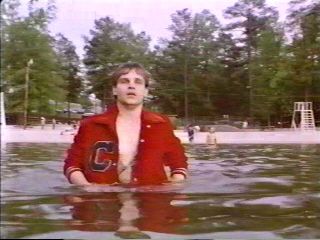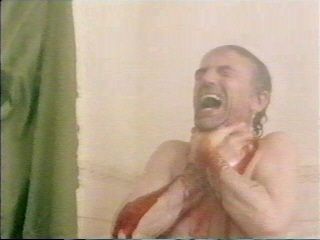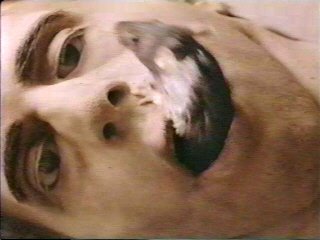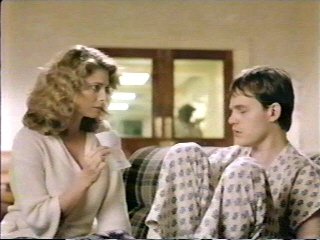|
The Sender
(1982)
Director: Roger Christian
Cast: Kathryn Harrold, Shirley Knight, Paul Freeman
I think many people will agree with me that Battlefield
Earth
is the Heaven's Gate of our time. Or the Ishtar
of our time. Or the Sgt. Pepper's Lonely Heart's Club Band of
our time. Or... I think you've got the point by now. In other words, a
big movie that fails so completely that you cannot help but constantly
hear bad reports about it - which in turn perks up your curiosity
enough that you have to check out the movie yourself. Admit it - you've
seen Battlefield Earth. So did I - terrible, wasn't it?
The critics sure were right about its awfulness, and I can certainly
understand and  sympathize with their attacks
against director Roger Christian. Though reading their reviews, I did
notice more than once that one of their comments concerning Christian
was actually unfounded. That comment was to the effect that Christian -
who had previously filmed a lengthy string of critical and financial
bombs like Masterminds and Nostrodamus -
seemed to have no concept as to how to properly
direct a movie. Though he has indeed made a number of turkeys, his
career isn't just one big blemish, and this can be proved by looking at
the obscure 1982 horror movie The Sender. Not only is
this movie Christian's directorial debut, while it is definitely an
uneven piece of work, there are a number of times when Christian does
get it right. In fact, he gets it right enough time that I could accept
the whole package, flaws and all. sympathize with their attacks
against director Roger Christian. Though reading their reviews, I did
notice more than once that one of their comments concerning Christian
was actually unfounded. That comment was to the effect that Christian -
who had previously filmed a lengthy string of critical and financial
bombs like Masterminds and Nostrodamus -
seemed to have no concept as to how to properly
direct a movie. Though he has indeed made a number of turkeys, his
career isn't just one big blemish, and this can be proved by looking at
the obscure 1982 horror movie The Sender. Not only is
this movie Christian's directorial debut, while it is definitely an
uneven piece of work, there are a number of times when Christian does
get it right. In fact, he gets it right enough time that I could accept
the whole package, flaws and all.
The Sender, released during the height of
the horror movie craze in the early '80s, differs from not being one of
the typical splatters of the era - it can be considered more akin to
movies like The Fury or Scanners. Not
just in the subject matter, but that it takes its premise much more
seriously than many other horror movies. It's also not content to
present things in a conventional manner, which it does right from the
opening, where a mysterious young man (Zeljko Ivanek, of the TV show Oz,
and who recently appeared in Black Hawk Down) is seen
waking up after spending the night sleeping by a highway. With
something obviously troubling him (though we don't know what), we see
him start walking down the highway, until he gets to a public beach.
Then in front of everyone at the beach, the mysterious young man
attempts suicide - and the camera forces us to look at every painful
step of the process, with an unblinking eye and no reaction cuts to
anyone else at the beach. Even when the young man goes under the
surface of the water, we are not spared from seeing what is happening
to him. An unforgettable opening, and one that gives us the first hint
that this movie is going to be filled with the unexpected.
The young man is rescued (offscreen), and is transported
to a mental hospital. Like in the opening of the movie, we still don't
know where we are (the hospital itself is never given a name clearer
than "State Mental Hospital".) The movie's stubborn refusal to give us
something to hold onto so we can be assured that something we've seen
before will happen here continues when Dr. Farmer (Harrold, of TV's Chicago
Hope) labels this new amnesia-suffering patient of hers "John Doe
#83" (which he is referred to as for the rest of the movie.) As well,
the other patients in the ward are also never referred to by their
actual names - for example, the patient who is a Jesus freak is always
called "The Messiah", even by the staff.
Plunged into such an unfamiliar environment where normal procedures
don't
seem to be happening, it's quite an unsettling experience. So you can
imagine how it must feel  when
really strange events things start to occur not long after John Doe #83
is checked in. That night, alone in her home, Dr. Farmer sees and hears
John break into her home and steal her necklace, but calling the
hospital afterwards reveals that John is still fast asleep there, and
the police find her missing necklace on her nightstand. Strange things
start happening at the hospital - she finds a swarm of cockroaches in a
medical refrigerator which disappear seconds later, and a mysterious
woman (Shirley Knight) claiming to be John's mother mysteriously
appears to give Dr. Framer warnings to the effect that it's dangerous
to keep her son in the hospital. when
really strange events things start to occur not long after John Doe #83
is checked in. That night, alone in her home, Dr. Farmer sees and hears
John break into her home and steal her necklace, but calling the
hospital afterwards reveals that John is still fast asleep there, and
the police find her missing necklace on her nightstand. Strange things
start happening at the hospital - she finds a swarm of cockroaches in a
medical refrigerator which disappear seconds later, and a mysterious
woman (Shirley Knight) claiming to be John's mother mysteriously
appears to give Dr. Framer warnings to the effect that it's dangerous
to keep her son in the hospital.
Dr. Farmer's reactions to these and the other bizarre
phenomenon she encounters are related to one of the things that I found
refreshing about The Sender, in how it treats its
characters with respect and intelligence. In another movie, Dr. Farmer
would spend most of the movie in the dark about what is going on, but
in this movie she has a pretty good theory as to the cause of these
incidents around the time of the second occurrence. This is a smart
woman - we could see that even before the bizarre phenomenon, when (in
a very good scene) she interviewed the reluctant John and was
successfully able to press some sensitive buttons he thought he was
keeping hidden.
I should point out that a lot of the credit to making Dr. Farmer come
across well comes from actress Harrold herself. She plays the doctor as
one who is very curious, but at the same time always acts professional
- you never expect this doctor to be so compassionate that she'll treat
her patients like her friends, which is just how a doctor is supposed
to act in real life. Dr. Farmer's colleagues are also acted/written not
only with professionalism in mind, but also without some clichés you
may think will be brought up again. When Dr. Farmer brings up the
theory that John Doe might have some kind of psychic power, their
reaction is more receptive than you might think. Though they do
eventually go against Dr. Farmer's wishes, you can actually see reason
behind why they decide to do what they do (to their regret, of course -
but I won't get into that.) Even the patients on the ward have been
written with respect and intelligence. The movie's other exceptional
performance (and one that is more subtle) comes from Ivanek as John
Doe, who manages the difficult task of showing his character's mental
anguish with very little dialogue. (And going away from the usual
convention, his character is not seen as a villain.) Even the other
patients on the ward have not been forgotten about. Though clearly
mentally ill, you can still see the human being in them. There is some
comic relief that comes from them, but it never comes across as
mocking. You almost wish the movie spent more time with these
interesting people.
Though most of us do want our horror movies to have
characters that are interesting enough, I think we can all admit that
the primary reason we see horror movies is to satisfy our gut instincts
to be entertained by the base material to be found in these movies.
This movie does have a share of bloody moments, but they come across
with a different tone. For one thing, they are far less gruesome than
you'd think. (Though rated R at the time, if this movie came out today
I wouldn't be surprised if it got a PG-13 rating.) Also, the gore in
itself is not the heart of the shocks in these sequences, but is used
to give a slight boost to these shocks. Though the gore is fleeting and
sporadic, that's what makes it work. For a long period we are gently
treated, then all of a sudden the suspense starts and keeps building
until WHAM - we are startled by what we see.
Some cynics might say that the lack of gore is due to the movie's
obvious low budget. Though Christian didn't have a lot of money to make
any elaborate setpieces, he uses a lot of low-cost yet effective  techniques to stretch every dollar. The big
sequence when the other doctors finally learn of John Doe's talent uses
several such techniques - among them slow motion, a dreamy atmosphere
(parts of this movie really capture what a dream is like), characters
expressing horror with facial expressions instead with their voices,
and the Trevor Jones musical score. (Creepy throughout, the score also
wisely knows when to shut up when a particular scene will be more
frightening in silence.) It's not just using these techniques that
makes a scene work, but using these techniques well - it's obvious that
a lot of work went into choreographing and positioning everything and
everyone just right, so instead of looking hokey and planned, it looks
natural and scary. techniques to stretch every dollar. The big
sequence when the other doctors finally learn of John Doe's talent uses
several such techniques - among them slow motion, a dreamy atmosphere
(parts of this movie really capture what a dream is like), characters
expressing horror with facial expressions instead with their voices,
and the Trevor Jones musical score. (Creepy throughout, the score also
wisely knows when to shut up when a particular scene will be more
frightening in silence.) It's not just using these techniques that
makes a scene work, but using these techniques well - it's obvious that
a lot of work went into choreographing and positioning everything and
everyone just right, so instead of looking hokey and planned, it looks
natural and scary.
What also makes the movie's scary sequences really work is the movie
constantly flirting with placing a disturbing tone in itself, even if a
particular sequence isn't meant to have any shocks. As we eventually
learn along with Dr. Farmer, psychic powers aren't always a blessing -
they can be a bitter curse, not just for those on the receiving end,
but for the sender as well. Clearly, John Doe is overwhelmed by his
powers, and he obviously isn't enjoying what he places himself (and
others) through. It's also clear that he cannot voluntarily stop doing
what he does, and the fact that this horror is coming from a seemingly
unstoppable source is disturbing in its own right.
The movie manages to find a number of ways to keep giving the audience
chills and shocks, though when it comes to properly explaining
everything and tying up every running thread to lead into a satisfying
ending, it falls short. To begin with, the climatic sequence just isn't
that. Though the events that subsequently happen after it supposedly
came because of what previously happened, I simply could not see how
the events in this climax managed to subsequently change things. The
status quo just isn't affected. As well, what actually happens in this
climax is rather underwhelming; the movie had been leading up to a big
explosion of some kind, yet just before hitting the dynamite, the flame
on the fuse hits a soggy section and completely fizzles out. You cannot
help but think, "That's it???"
The other big problem in the movie is that it leads a lot of questions
that are never answered. I, for one, can accept a reasonable amount of
mystery in a horror movie -  after all,
it didn't matter why the dead were rising in Night Of The Living
Dead. But the mysteries that go unanswered in The Sender
are waved in our face in a way that indicates they will eventually be
answered - and they aren't. For example, what is the significance of
"1963"? And who did that telephone number belong to? These and several
other questions are never properly dealt with. It eventually proves to
be quite frustrating, especially when more questions of these types
start occurring to you after the movie is over. Still, while the movie
is a kind of trip to nowhere, it does at least provide a lot of
interesting diversions along the way. As sloppy and unfinished as
things are, I think there's enough decent material here to make a
rental worthwhile, as long as at the time you're accepting of a movie
that'll make you think, "Cool - though it sure could have been better." after all,
it didn't matter why the dead were rising in Night Of The Living
Dead. But the mysteries that go unanswered in The Sender
are waved in our face in a way that indicates they will eventually be
answered - and they aren't. For example, what is the significance of
"1963"? And who did that telephone number belong to? These and several
other questions are never properly dealt with. It eventually proves to
be quite frustrating, especially when more questions of these types
start occurring to you after the movie is over. Still, while the movie
is a kind of trip to nowhere, it does at least provide a lot of
interesting diversions along the way. As sloppy and unfinished as
things are, I think there's enough decent material here to make a
rental worthwhile, as long as at the time you're accepting of a movie
that'll make you think, "Cool - though it sure could have been better."
Check for availability on Amazon (VHS)
Check for availability on Amazon (DVD)
See also: The Doorway, The Other, Voodoo
|

 sympathize with their attacks
against director Roger Christian. Though reading their reviews, I did
notice more than once that one of their comments concerning Christian
was actually unfounded. That comment was to the effect that Christian -
who had previously filmed a lengthy string of critical and financial
bombs like Masterminds and Nostrodamus -
seemed to have no concept as to how to properly
direct a movie. Though he has indeed made a number of turkeys, his
career isn't just one big blemish, and this can be proved by looking at
the obscure 1982 horror movie The Sender. Not only is
this movie Christian's directorial debut, while it is definitely an
uneven piece of work, there are a number of times when Christian does
get it right. In fact, he gets it right enough time that I could accept
the whole package, flaws and all.
sympathize with their attacks
against director Roger Christian. Though reading their reviews, I did
notice more than once that one of their comments concerning Christian
was actually unfounded. That comment was to the effect that Christian -
who had previously filmed a lengthy string of critical and financial
bombs like Masterminds and Nostrodamus -
seemed to have no concept as to how to properly
direct a movie. Though he has indeed made a number of turkeys, his
career isn't just one big blemish, and this can be proved by looking at
the obscure 1982 horror movie The Sender. Not only is
this movie Christian's directorial debut, while it is definitely an
uneven piece of work, there are a number of times when Christian does
get it right. In fact, he gets it right enough time that I could accept
the whole package, flaws and all. when
really strange events things start to occur not long after John Doe #83
is checked in. That night, alone in her home, Dr. Farmer sees and hears
John break into her home and steal her necklace, but calling the
hospital afterwards reveals that John is still fast asleep there, and
the police find her missing necklace on her nightstand. Strange things
start happening at the hospital - she finds a swarm of cockroaches in a
medical refrigerator which disappear seconds later, and a mysterious
woman (Shirley Knight) claiming to be John's mother mysteriously
appears to give Dr. Framer warnings to the effect that it's dangerous
to keep her son in the hospital.
when
really strange events things start to occur not long after John Doe #83
is checked in. That night, alone in her home, Dr. Farmer sees and hears
John break into her home and steal her necklace, but calling the
hospital afterwards reveals that John is still fast asleep there, and
the police find her missing necklace on her nightstand. Strange things
start happening at the hospital - she finds a swarm of cockroaches in a
medical refrigerator which disappear seconds later, and a mysterious
woman (Shirley Knight) claiming to be John's mother mysteriously
appears to give Dr. Framer warnings to the effect that it's dangerous
to keep her son in the hospital. techniques to stretch every dollar. The big
sequence when the other doctors finally learn of John Doe's talent uses
several such techniques - among them slow motion, a dreamy atmosphere
(parts of this movie really capture what a dream is like), characters
expressing horror with facial expressions instead with their voices,
and the Trevor Jones musical score. (Creepy throughout, the score also
wisely knows when to shut up when a particular scene will be more
frightening in silence.) It's not just using these techniques that
makes a scene work, but using these techniques well - it's obvious that
a lot of work went into choreographing and positioning everything and
everyone just right, so instead of looking hokey and planned, it looks
natural and scary.
techniques to stretch every dollar. The big
sequence when the other doctors finally learn of John Doe's talent uses
several such techniques - among them slow motion, a dreamy atmosphere
(parts of this movie really capture what a dream is like), characters
expressing horror with facial expressions instead with their voices,
and the Trevor Jones musical score. (Creepy throughout, the score also
wisely knows when to shut up when a particular scene will be more
frightening in silence.) It's not just using these techniques that
makes a scene work, but using these techniques well - it's obvious that
a lot of work went into choreographing and positioning everything and
everyone just right, so instead of looking hokey and planned, it looks
natural and scary. after all,
it didn't matter why the dead were rising in Night Of The Living
Dead. But the mysteries that go unanswered in The Sender
are waved in our face in a way that indicates they will eventually be
answered - and they aren't. For example, what is the significance of
"1963"? And who did that telephone number belong to? These and several
other questions are never properly dealt with. It eventually proves to
be quite frustrating, especially when more questions of these types
start occurring to you after the movie is over. Still, while the movie
is a kind of trip to nowhere, it does at least provide a lot of
interesting diversions along the way. As sloppy and unfinished as
things are, I think there's enough decent material here to make a
rental worthwhile, as long as at the time you're accepting of a movie
that'll make you think, "Cool - though it sure could have been better."
after all,
it didn't matter why the dead were rising in Night Of The Living
Dead. But the mysteries that go unanswered in The Sender
are waved in our face in a way that indicates they will eventually be
answered - and they aren't. For example, what is the significance of
"1963"? And who did that telephone number belong to? These and several
other questions are never properly dealt with. It eventually proves to
be quite frustrating, especially when more questions of these types
start occurring to you after the movie is over. Still, while the movie
is a kind of trip to nowhere, it does at least provide a lot of
interesting diversions along the way. As sloppy and unfinished as
things are, I think there's enough decent material here to make a
rental worthwhile, as long as at the time you're accepting of a movie
that'll make you think, "Cool - though it sure could have been better."